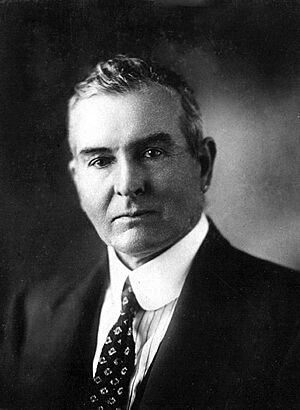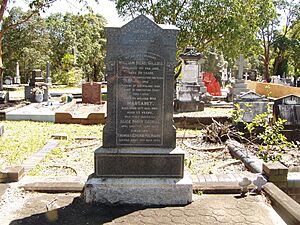William Gillies (Australian politician) facts for kids
Quick facts for kids
William Gillies
|
|
|---|---|

Gillies in 1920
|
|
| 21st Premier of Queensland | |
| In office 26 February 1925 – 22 October 1925 |
|
| Governor | Matthew Nathan |
| Deputy | William McCormack |
| Preceded by | Ted Theodore |
| Succeeded by | William McCormack |
| Constituency | Eacham |
| 26th Treasurer of Queensland | |
| In office 26 February 1925 – 22 October 1925 |
|
| Preceded by | Ted Theodore |
| Succeeded by | William McCormack |
| Constituency | Eacham |
| Member of the Queensland Legislative Assembly for Eacham |
|
| In office 27 April 1912 – 24 October 1925 |
|
| Preceded by | New seat |
| Succeeded by | Cornelius Ryan |
| Personal details | |
| Born | 27 October 1868 Eccleston, New South Wales |
| Died | 9 February 1928 (aged 59) Toowong, Brisbane, Queensland, Australia |
| Resting place | Toowong Cemetery |
| Political party | Labor |
| Spouse |
Margaret Smith
(m. 1900) |
| Relations | Robert Gillies (brother) |
| Profession | Farmer |
William Neal Gillies (born 27 October 1868 – died 9 February 1928) was an Australian politician. He was a member of the Labor Party and served as the premier of Queensland for a short time in 1925. The Premier is the leader of the state government.
Early Life and Farming
William Gillies was born in Eccleston, New South Wales, in 1868. His parents, Dougald and Mary Gillies, were farmers who had moved from Scotland.
William went to local schools. In 1882, when he was about 14, his family moved to the village of Tintenbar. There, he became a farmer, growing crops like sugar cane. This is where he started to become interested in public issues and helping his community.
In 1900, William Gillies married Margaret Smith.
Starting in Politics
William Gillies was very active in groups that helped farmers and local people. He was involved in the "anti-alien league," which aimed to protect local jobs. He also became the president of the New South Wales sugar growers defence league, working to support sugar cane farmers.
He tried to enter politics in 1910, running for a seat in the Australian federal election, but he did not win. He also tried for a seat in the New South Wales state parliament but was unsuccessful.
Late in 1910, Gillies moved to Queensland and bought some land. In 1912, he successfully won the Eacham seat in the Legislative Assembly of Queensland for the Labor Party. He held this position until he retired from politics.
Serving Queensland
William Gillies became an important part of the Queensland government. From 1918 to 1919, he was an assistant minister for justice. For a few weeks in 1919, he was the secretary for agriculture and stock.
He then held the position of secretary for agriculture and stock from 1919 to 1925 under Premier Ted Theodore. Because he had been a farmer himself, his practical experience was very helpful. During this time, many new laws were made to help farming. The cotton industry started, and the sugar and other farming industries became more stable.
When Premier Ted Theodore resigned, William Gillies became the Premier of Queensland on 26 February 1925. He also took on the roles of chief secretary and treasurer.
His time as Premier was challenging because there were many strikes and disagreements among workers. Gillies was known for having balanced views, but some members of his party had more extreme ideas. He tried his best to find solutions, but he decided to resign on 27 October 1925.
After resigning as Premier, he became a member of the new board of trade and arbitration. This board helped solve problems between workers and businesses. He worked hard and fairly in this role. However, the work was very demanding, and he sadly passed away suddenly on 9 February 1928.
Lasting Impact
William Gillies was given a state funeral, which is a special ceremony for important people. It took place at St Andrew's Presbyterian Church and he was buried at Toowong Cemetery in Brisbane.
A road in Far North Queensland, called the Gillies Highway, was named after William Neil Gillies. This is because he helped create the Main Roads Board, which was important for building and maintaining roads in Queensland.
 | Stephanie Wilson |
 | Charles Bolden |
 | Ronald McNair |
 | Frederick D. Gregory |


